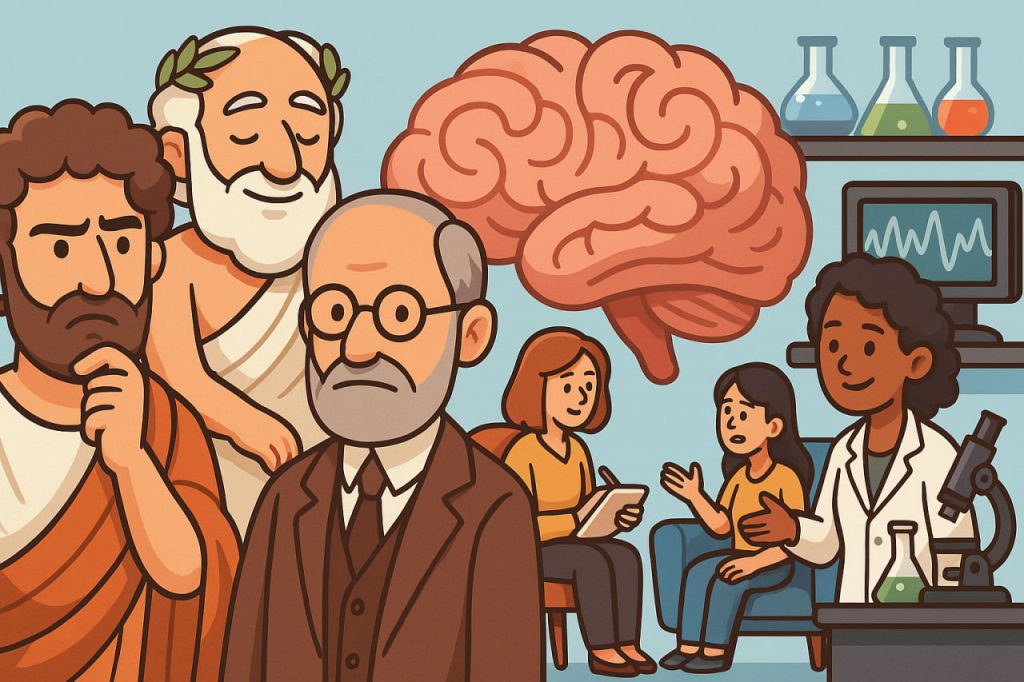Understanding human behavior and the mind has fascinated humanity for centuries. Psychology, as a scientific field, has developed from philosophical speculation into a rich discipline that combines theory, research, and practice. Today, psychology touches nearly every aspect of human life—from education and health to business and social relationships.
Early Roots of Psychology
The origins of psychology can be traced back to ancient philosophers such as Aristotle, Plato, and Confucius, who questioned how the mind works, what drives behavior, and how emotions influence decisions. For centuries, psychology was a branch of philosophy until the late 19th century, when researchers began applying scientific methods to study the mind and behavior.
Birth of Psychology as a Science
Modern psychology began in 1879, when Wilhelm Wundt established the first laboratory dedicated to psychological research in Leipzig, Germany. His focus was on introspection, the systematic observation of one’s own mental processes. Soon, other schools of thought appeared, including psychoanalysis by Sigmund Freud, behaviorism by John B. Watson and B.F. Skinner, and humanistic psychology led by Carl Rogers and Abraham Maslow.
Psychology in the 20th Century
Throughout the 20th century, psychology evolved rapidly. Cognitive psychology emerged, emphasizing thought processes, memory, and learning, while neuroscience connected brain activity with mental functions. Psychologists began applying findings to practical areas such as therapy, education, and workplace productivity. This period also saw the development of standardized tests for intelligence and personality.
Modern Psychology Today
Today, psychology is a diverse and interdisciplinary science. It includes areas such as clinical psychology, developmental psychology, social psychology, cognitive neuroscience, and health psychology. The field combines traditional research with cutting-edge technologies like brain imaging and artificial intelligence. Modern psychologists not only treat mental health disorders but also promote well-being, resilience, and personal growth.
Psychology in Everyday Life
Psychology influences daily life in countless ways. It shapes how we learn, communicate, manage stress, resolve conflicts, and make decisions. Businesses use psychological insights in marketing and leadership, while education systems apply them to improve teaching methods. In healthcare, psychology plays a crucial role in supporting patients and encouraging healthier lifestyles.
The Future of Psychology
As global challenges such as climate change, digitalization, and social inequality grow, psychology will continue to adapt. Research on digital behavior, emotional well-being in a connected world, and cross-cultural understanding will play a key role. The discipline is expected to become even more integrated with biology, technology, and social sciences.
But originally, psychology was the science of the soul, what is inside us, and it had to study everything related to it. Fortunately, many prominent psychologists have started talking about this now.
Glossary
- Introspection – observing and analyzing one’s own thoughts and feelings.
- Psychoanalysis – a psychological theory and therapy founded by Sigmund Freud, focusing on unconscious processes.
- Behaviorism – a school of psychology that studies observable behavior rather than internal mental states.
- Cognitive psychology – the study of mental processes such as memory, learning, and problem-solving.
- Clinical psychology – a branch focused on diagnosing and treating mental health issues.


